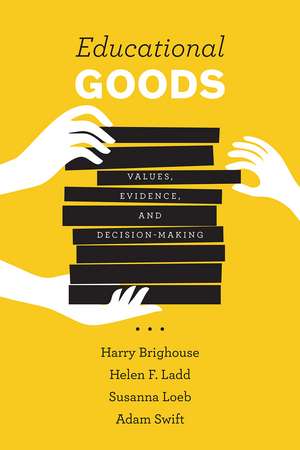Educational Goods: Values, Evidence, and Decision-Making
Autor Harry Brighouse, Helen F. Ladd, Susanna Loeb, Adam Swiften Limba Engleză Paperback – 24 ian 2018
We spend a lot of time arguing about how schools might be improved. But we rarely take a step back to ask what we as a society should be looking for from education—what exactly should those who make decisions be trying to achieve?
In Educational Goods, two philosophers and two social scientists address this very question. They begin by broadening the language for talking about educational policy: “educational goods” are the knowledge, skills, and attitudes that children develop for their own benefit and that of others; “childhood goods” are the valuable experiences and freedoms that make childhood a distinct phase of life. Balancing those, and understanding that not all of them can be measured through traditional methods, is a key first step. From there, they show how to think clearly about how those goods are distributed and propose a method for combining values and evidence to reach decisions. They conclude by showing the method in action, offering detailed accounts of how it might be applied in school finance, accountability, and choice. The result is a reimagining of our decision making about schools, one that will sharpen our thinking on familiar debates and push us toward better outcomes.
In Educational Goods, two philosophers and two social scientists address this very question. They begin by broadening the language for talking about educational policy: “educational goods” are the knowledge, skills, and attitudes that children develop for their own benefit and that of others; “childhood goods” are the valuable experiences and freedoms that make childhood a distinct phase of life. Balancing those, and understanding that not all of them can be measured through traditional methods, is a key first step. From there, they show how to think clearly about how those goods are distributed and propose a method for combining values and evidence to reach decisions. They conclude by showing the method in action, offering detailed accounts of how it might be applied in school finance, accountability, and choice. The result is a reimagining of our decision making about schools, one that will sharpen our thinking on familiar debates and push us toward better outcomes.
Preț: 183.89 lei
Nou
Puncte Express: 276
Preț estimativ în valută:
35.19€ • 36.61$ • 29.05£
35.19€ • 36.61$ • 29.05£
Carte disponibilă
Livrare economică 24 martie-07 aprilie
Livrare express 08-14 martie pentru 20.98 lei
Preluare comenzi: 021 569.72.76
Specificații
ISBN-13: 9780226514178
ISBN-10: 022651417X
Pagini: 192
Ilustrații: 8 halftones, 4 line drawings
Dimensiuni: 152 x 229 x 15 mm
Greutate: 0.29 kg
Ediția:1
Editura: University of Chicago Press
Colecția University of Chicago Press
ISBN-10: 022651417X
Pagini: 192
Ilustrații: 8 halftones, 4 line drawings
Dimensiuni: 152 x 229 x 15 mm
Greutate: 0.29 kg
Ediția:1
Editura: University of Chicago Press
Colecția University of Chicago Press
Notă biografică
Harry Brighouse is professor of philosophy, affiliate professor of educational policy studies, and Dickson Bascom Professor of the Humanities at the University of Wisconsin–Madison. Helen F. Ladd is professor emerita at Duke University. Susanna Loeb is the Barnett Family Professor of Education at Stanford University. Adam Swift is professor of political theory at the University of Warwick.
Cuprins
List of Figures
Preface and Acknowledgments
Introduction
Part 1 Values
1 Educational Goods
2 Distributive Values and Independent Values
3 Achievement as an Educational Good
Part 2 Decision Making
4 Combining Values and Evidence
5 School Finance
6 School Accountability
7 School Autonomy and Parental Choice
Conclusion
Notes
Bibliography
Index
Preface and Acknowledgments
Introduction
Part 1 Values
1 Educational Goods
2 Distributive Values and Independent Values
3 Achievement as an Educational Good
Part 2 Decision Making
4 Combining Values and Evidence
5 School Finance
6 School Accountability
7 School Autonomy and Parental Choice
Conclusion
Notes
Bibliography
Index
